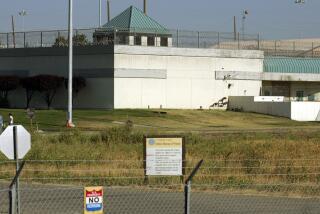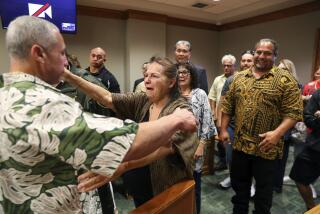Northern Ireland Prison Escapee Claims He Feared for His Life
- Share via
SAN FRANCISCO — An escapee from a prison in Northern Ireland who was arrested in San Diego in June filed court papers Friday saying he was given a life sentence after being coerced into confessing to a murder he did not commit.
The man who was known as Kevin Barry John Artt when he joined the mass breakout from Maze prison in 1983, and now calls himself Kevin Keohane, outlined his planned defense against a U.S. charge of passport fraud and an extradition request from the United Kingdom. He was living on a houseboat in San Diego’s Mission Bay when he was arrested last June.
In both the murder confession and the prison escape, he said through lawyers, he acted in fear of being harmed or killed in prison in his native country, where he was convicted in a mass trial of the 1978 murder of a deputy prison warden. A hearing on his attempt to argue the so-called necessity defense is scheduled Oct. 6 before U.S. District Judge Charles Legge.
Keohane has admitted taking part in the September, 1983, escape of 38 prisoners from the Maze, near Belfast.
In support of his claim of mistreatment in prison, he has cited a 1990 decision by the Supreme Court of the Republic of Ireland, saying that, after the escape, Maze guards set dogs on some of the remaining prisoners, denied them medical care for over a week, and falsely denied the attacks in court. That ruling denied extradition to Northern Ireland of another Maze escapee.
Keohane’s papers, signed by attorney George Harris, provided the first detailed information about him since his arrest.
Harris said Kevin Artt was raised in a Belfast suburb by a Catholic aunt and uncle, whose business was bombed several times by Protestant militants. He left home and, at 16, went to work for an unlicensed taxi company that drove Catholics between Catholic neighborhoods.
After the fatal shooting of Albert Miles, deputy warden of the Maze, in November, 1978, Artt, still a teen-ager, was arrested and interrogated for a week in isolation, then released, Harris said. Sometime afterward, his landlord was shot and seriously wounded, a shooting that a constable later told Artt was meant for him, Harris said. He said Artt was later chased by gunmen and his cab was firebombed.
He was arrested again in late 1981, questioned for days about Miles’ murder and beaten once, Harris said. At one point, another man was brought in and named Artt as his accomplice in the murder, an accusation he later retracted. Artt eventually signed a false confession after being told it was his only chance of ever being released, Harris said.
At a non-jury trial of 38 men, Artt’s confession was the only evidence against him, Harris said. He disputed the confession, but was unable to persuade the judge trying the case that it was the product of torture. Out of 35 convictions, 18 were overturned in 1986, Harris said.
He said Artt lived in constant fear of injury or death during the few weeks he spent in e Maze before his escape. Harris gave no details of Artt’s entry into the United States; in 1986, he said, the fugitive thought he had been recognized in San Francisco by people from Belfast, changed his name to Keohane, got a new passport and moved to San Diego.
That passport, the basis of the U.S. criminal charge, was not obtained for an illegal purpose, Harris wrote, because Keohane “had no legal alternative by which to avoid the threat of serious injury or death.”
A second Maze escapee facing charges in San Francisco, James Joseph Smyth, appeared in court Friday in preparation for trials starting next February in similar passport and extradition cases.
U.S. District Judge Barbara Caulfield scheduled a hearing Dec. 4 on whether Smyth can argue that he fled and falsified a passport to save his life. Smyth, who describes himself as an Irish nationalist, says he will show he was falsely convicted of the 1977 attempted murder of a prison guard.
Keohane is being held without bail, but Caulfield has freed Smyth on $1.5 million bail, saying he presented no risk of flight or danger to the public and could help his lawyer prepare his defense more adequately if he lived at home with his wife rather than in jail.
More to Read
Sign up for Essential California
The most important California stories and recommendations in your inbox every morning.
You may occasionally receive promotional content from the Los Angeles Times.













